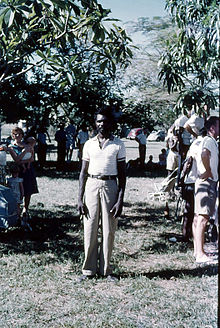| Robert Tudawali | |
|---|---|
 Tudawali in 1955 Tudawali in 1955 | |
| Born | Robert Tudawali 1929 (1929) Melville Island, Northern Territory, Australia |
| Died | 26 July 1967(1967-07-26) (aged 37–38) Darwin, Northern Territory, Australia |
| Resting place | Darwin Cemetery |
| Occupation(s) | Actor, activist |
Robert Tudawali (1929 – 26 July 1967), also known as Bobby or Bob Wilson, was an Australian actor and Indigenous activist. He is known for his leading role in the 1955 Australian film Jedda, a role for which he was specifically chosen by the film's director, Charles Chauvel and his wife Elsa, and which made him the first Indigenous Australian film star, Tudawali served as vice-president of the Northern Territory Council for Aboriginal Rights.
The Tudawali Indigenous Film and Television Awards (Tudawali Awards) continue to recognise his legacy and award outstanding achievements of Indigenous people within the Australian film industry.
Early life
Tudawali was born and raised on Melville Island in the Northern Territory to Tiwi parents.
Although he had only a basic education in Kahlin Compound and Half Caste Home in Darwin, Tudawali gained a rich English vocabulary. He was a leading Australian rules footballer as a youth, and he alternated several times between Aboriginal and white society. He used the name Bobby Wilson in Darwin when he travelled there by canoe in the late 1930s, using the surname of his father's employer. He was an orderly with the Royal Australian Air Force, worked briefly in an army store and mechanical workshop, and also as a waiter before becoming an actor.
Actor and activist

Tudawali became the first Indigenous Australian film star as a result of playing the lead role, Marbuck, in the 1955 Australian film Jedda. In 1958 he played the role of Emu Foot in Dust in the Sun, a mystery film adapted from the novel Justin Bayard by Jon Cleary and produced by the team of Lee Robinson and Chips Rafferty.
Under the name Bobby Wilson, he took part in various episodes of the 1960 TV series Whiplash, and featured in the ABC television play Burst of Summer in 1961. It has been argued Tudawali's role in the latter was closest to his real personality.
Tudawali served as vice-president of the Northern Territory Council for Aboriginal Rights in 1966 and, working with activist Dexter Daniels, trade unionist and activist Brian Manning and author Frank Hardy, fought to highlight the poor wages and conditions of Aboriginal stockmen in the Northern Territory, which culminated in the Wave Hill walk-off in 1966. Tudawali had organised to give a series of talks to unionists throughout Australia in support of the stockmen when the Northern Territory administration banned any travel by Tudawali due to the tuberculosis he was suffering at the time.
Personal and later life
Tudawali was married to Peggy Wogait in 1948 and they lived at the Bagot Aboriginal Reserve (where all of the residents of Kahlin had been moved in 1938); later he married a woman named Nancy.
He died of tuberculosis and severe burns at Darwin Hospital on 26 July 1967, following an incident at Bagot where an argument had broken out when he refused to offer his 11-year-old daughter Christine for marriage.
His funeral took place at Nightcliff, Northern Territory.
Filmography
- Jedda (1955) as Marbuck
- Dust in the Sun (1955) as Emu Foot
- Whiplash (1959–1960, Seven Network, TV series) as Kuanspa / Kuraba / Mundaru / Kogarah / Dalgowlie / Native Boy / Roonga (final appearance)
- TV adaptation of the play Burst of Summer (1961, ABC Television), by Oriel Gray, based on the story of Ngarla Kunoth, who played the lead role in Jedda. Tudawali was flown from Darwin to Melbourne to make this first appearance in a live television drama. as Don Reynolds
Legacy
In 1987, Steve Jodrell directed Tudawali, a made-for-television docu-drama about the man, with Ernie Dingo in the title role.
In about 1993, the Media Resource Centre announced a new award for Indigenous film-making, called the Tudawali Award.
References
- ^ Forrest, Peter. "Tudawali, Robert (1929–1967)". Australian Dictionary of Biography. Australian National University. Retrieved 12 August 2012.
- Vagg, Stephen (15 November 2020). "The Flawed Landmark: Burst of Summer". Filmink.
- ^ Snowdon, W., "“Sometime we bin get extra salt on the beef.” Heroes of the Northern Territory", Crikey, http://blogs.crikey.com.au/northern/2012/08/16/sometime-we-bin-get-extra-salt-on-the-beef-heroes-of-the-northern-territory/ Accessed 18 August 2012.
- "Bagot Aboriginal Reserve (1938–1978)". Find and Connect. Retrieved 22 November 2019.
- "Tudawali funeral". The Canberra Times. Vol. 41, no. 11, 765. Australian Capital Territory, Australia. 12 August 1967. p. 7. Retrieved 30 May 2016 – via National Library of Australia.
- ^ "TV Merry Go Round", Sydney Morning Herald, 8 October 1961 p 84
- Tudawali Archived 9 May 2011 at the Wayback Machine, Australian feature films shot in or set in or first shown in or partly financed by Western Australia.
- Ed. Scott Murray, Australia on the Small Screen 1970–1995, Oxford Uni Press, 1996 p156
- "[Film : ephemeral materials] (catalogue entry for a folder of miscellaneous materials)". AITSIS. Retrieved 22 November 2019.
The Tudawali Award : The Media Resource Centre announces a new award for Indigenous fimmaking
Further reading
- Search here for Robert Tudawali (National Film and Sound Archive)
- Robert Tudawali (Territory Stories, 1955 photo)
Tudawali Awards
- Indigenous filmmakers honoured in awards night (Sydney Morning Herald, 21 May 2001)
- Screen Australia’s Indigenous Department celebrates 25 years (4 June 2018)
- Tudawali Awards and "Solid" (ABC Radio, Awaye, 11 February 2000)
External links
Categories:- 1929 births
- 1967 deaths
- 20th-century Australian male actors
- 20th-century deaths from tuberculosis
- Australian male film actors
- Australian rules footballers from the Northern Territory
- Male actors from the Northern Territory
- Indigenous Australian male actors
- Tuberculosis deaths in Australia
- Australian indigenous rights activists
- Royal Australian Air Force personnel